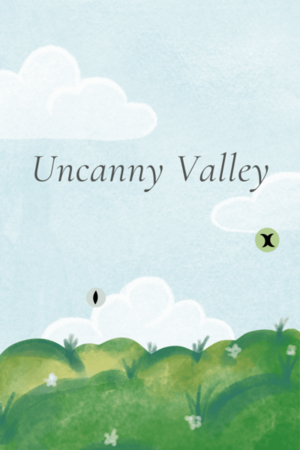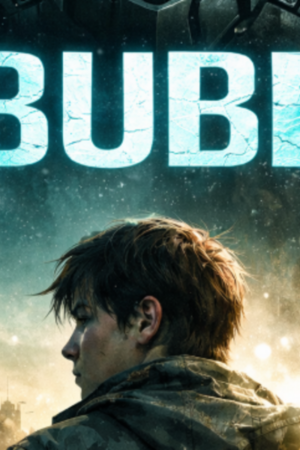Chapter 7:
The Thread That Held Me Captive
Threadbound
Dawn rose pale over the lake as Léa stood up, Momma clutched to her chest. She hadn’t slept at all that night, torn between resolve and the vertigo of what she was about to do. In the shadows of her room, the doll’s button eyes seemed to stare at her with a new intensity, as if sensing what lay ahead.
*You protected me, she mouthed silently. But not the way you should have. You kept me prisoner to your fears.*
Momma didn’t move. Yet Léa thought she saw a shiver in the worn fabric, a faint resistance that sent a chill down her spine.
She slipped into her mother’s wedding dress — a simple, faded gown, witness to a promise of happiness that had long since curdled into pain.
Today, she would offer it a different promise.
Not one of obedience. Not one of sacrifice.
But one of loving differently. Loving freely, sincerely, and with respect.
Before stepping outside, she retrieved her grandmother’s golden scissors. The blades gleamed coldly in the morning light, and Léa shivered at the thought of all the times those very scissors had been used to stitch Momma back together, to keep her intact, to preserve that suffocating bond that bound them.
The walk to the lake felt endless. With every step, Momma seemed to grow heavier in her arms, as if the doll was absorbing the full gravity of the moment. The red thread protruding from her heart throbbed faintly — one last pulse of that maternal hold that refused to let go.
The wood of the small dock creaked beneath her bare feet, familiar and strangely comforting. This was where her mother had come in those rare stolen moments of peace between blows and silence. Here, Céleste had sat with her feet in the water, humming prayers while gazing toward the horizon. And here, Léa had once come searching for peace when words had vanished from her throat.
But today, she was ready to reclaim that stolen voice.
She sat cross-legged on the rough boards and placed Momma in front of her. For the first time in weeks, the doll looked truly lifeless — nothing but an assembly of rags and memories. Yet her button eyes still held that peculiar gleam, that expression that had belonged to Céleste in her darkest moments.
The doll’s eyes seemed to squint, and Léa saw in them not a trace of pure love, but a mute supplication. Not tenderness, but something darker, hungrier. A possession disguised as affection. A need to control, draped in the guise of motherly protection.
She reached for the scissors with trembling hands. The red thread now beat like a frantic heart, and Léa had the absurd sensation that it was trying to flee the approaching blades.
*Forgive me, Mama,* she whispered without sound. *But your love is killing me.*
Just as the blades neared the thread, a sudden gust swept across the lake. Dead leaves whirled around her, and Léa thought she heard her mother’s voice carried on the wind:
“My darling, you’ve lost your way! That creature has perverted you. She’s the one you must—”
Léa closed her eyes as tears spilled down her cheeks. Yes, she loved her mother. Yes, she understood her fears, her wounds, her desperate need to protect her from a world she never truly understood. But that love had become poison. It destroyed everything it touched — including the real love that was now growing between her and Maya.
And with one clean motion, she cut the red thread.
Instantly, Momma collapsed, as if her strings had been severed. The button eyes lost their malevolent shine. The silence that followed was deafening — no more whispers, no more silent reproaches, no more oppressive presence that had clung to her since childhood.
Léa stared at the limp doll, and a wave of grief and relief washed over her. She had just destroyed, with her own hands, the embodiment of her mother — to save herself, and to save what she now held most dear.
With methodical care, she began to cut Momma into pieces. Each snip of the scissors was a liberation. Each fragment that fell lightened the weight on her chest. The strands of hair — her mother’s real hair, sewn into the doll’s scalp — were the first to go, swept away by the morning breeze like memories finally ready to fade.
When she finished, Léa gathered all the pieces in her open hands. Faded blue cloth, yellowed stuffing, lone buttons, unraveled threads — the remains of a love that had twisted into a gilded cage built of fear, faith, and inherited shame.
She rose to her feet, hands held out before her as though offering a sacred tribute. The sun had climbed higher now, turning the lake’s surface into a mirror of scattered gold. Around her, nature stirred in a riot of colors she hadn’t noticed in years. The world was coming back into focus — vivid, wild, alive.
*Goodbye,* she whispered.
A stronger gust swept the dock, and the pieces of Momma escaped her hands like a flock of multicolored butterflies. They danced in the air, carried by the gentle, liberating wind, before scattering across the lake and vanishing into the golden light.
Léa watched them go without regret. For the first time in twenty-two years, she could breathe freely. She was looking toward the future.
“Léa?”
Maya’s voice behind her made her start. She turned slowly, a tear trailing down her cheek. Maya stood at the end of the dock, still marked by everything that had happened. Her amber hair shimmered in the morning sun. She wore her saffron dress, the one that made her eyes glow with warmth, and Léa felt her heart leap.
She had kept her promise. She had come.
“Maya,” Léa said — and her voice, rough from disuse, rang strangely in the morning air. The words finally came, free from the prison of silence.
Maya brought her hands to her mouth, eyes gleaming with tears.
She ran into her arms, and Léa embraced her with all the strength she had. In that embrace, Léa felt the promise of something new — no more fear, no more judgment, no more love that smothered in the name of protection. Just the two of them, free to be who they truly were.
“I cut the thread that held me captive,” Léa whispered into Maya’s hair, her voice still fragile but filled with resolve.
She cast one last look at the lake where the last fragments of Momma had vanished, then turned her gaze toward the future — toward this woman who loved her despite her silence, her fears, her inherited ghosts.
The sun now hung high, transforming the lake into a cascade of diamonds. Léa looked ahead — toward all the words she could finally speak, toward every “I love you” she had kept buried for so long.
The thread was cut.
She was free.
And her voice, fragile yet real, now carried the promise of a future she would choose for herself.




Please sign in to leave a comment.